Rob Nunn's Blog: Interesting Though Elementary, page 2
February 2, 2025
Interesting Interview: Bruce Harris
Man, what can I say about Bruce Harris in this week's introduction? Everyone knows how great of a guy he is. He's known as a chronology guy, and rightly so, but Bruce's research goes so much farther afield than just putting things in order! He wrote a whole book footnoting D. Martin Dakin's classic text, A Sherlock Holmes Commentary. He's written articles on Porlock, "The Mazarin Stone," Holmes, nose, and pipes. There are even a one or two short pastiches out there under Bruce's byline.
So yeah, Bruce Harris is a chronology guy. But he's so much more. And justly recognized by the Baker Street Irregulars, he was invested as a member last month. Bruce goes deep into topics that he's writing about. And I really enjoy all of his writing that I've been lucky enough to come across so far. Bruce is a great guy, too, so I can always hear the smile in his voice when I read his pieces. If you've been lucky enough to meet Bruce in person, I hope his voice will be in your mind as you read his answers to this week's Interesting Interview. And if you haven't met Bruce yet, I hope you get the pleasure sometime in the future, because time spent with Bruce is time well spent!

How do you define the word “Sherlockian”?
My initial reaction mirrors former Supreme Court Justice Potter Stewart’s test for obscenity, “I know it when I see it.” I’ll amend it to, “I know one when I see one.” However, that’s not helpful. I believe Sherlockians exist along a continuum, and I would apply a liberal interpretation of the term. For example, someone who reads a story and is intrigued enough to pursue additional stories is in my mind a Sherlockian. Or, it could be someone who collects Sherlockian statues or collectibles. Admittedly, this is a low bar, and such folks would be on one end of the spectrum. This would apply as well to those who may have never read a story, but watched all (or several) of, for example, the Granada Holmes series. It shows some spark of interest in the great detective, one that could possibly be further nurtured. On the other extreme end are those that delve into the minutiae of the Canon, in other words, those who “play the game.”
How did you become a Sherlockian?
Well, based on my definition of a Sherlockian, I guess it occurred in 1965 after reading, “The Speckled Band.” It blew me away, and I quickly read the remaining stories in that little paperback. When that book was finished, I sought out every Holmes story and found The Complete Sherlock Holmes, which included Christopher Morley’s Preface. Once in college, I moved along the Sherlockian continuum after discovering a local scion society, The Anderson Murderers of North Carolina. Simultaneously, I joined a corresponding scion, The Unanswered Correspondents, founded by Bruce R. Beaman during the mid 1970’s. I’m happy to say my movement along the Sherlockian scale continues.
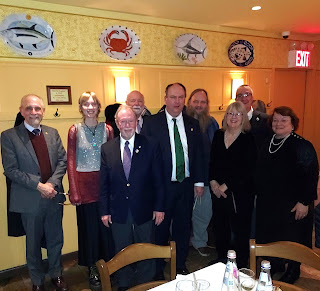 Some members of The Noble Correspondents (at the Foundry Dinner during the 2025 BSI weekend). The Noble Correspondents are a corresponding (via USPS) scion society founded Michael Barton in 2024. L-R: Burt Wolder, Cate Barton, Terry Hunt, Don Pollock, Michael Barton, Christian Monggaard, Rosemary Herbert, BH, Anna Behrens.
Some members of The Noble Correspondents (at the Foundry Dinner during the 2025 BSI weekend). The Noble Correspondents are a corresponding (via USPS) scion society founded Michael Barton in 2024. L-R: Burt Wolder, Cate Barton, Terry Hunt, Don Pollock, Michael Barton, Christian Monggaard, Rosemary Herbert, BH, Anna Behrens.
What is your profession (or previous if you are retired) and does that affect how you enjoy being a Sherlockian?
I’m retired from a 30-year career at UPS. I can’t say there was any impact on my enjoyment of being a Sherlockian. However, in a previous life, I received a Ph.D. in Social Psychology, and that has had a profound impact on my Sherlockian journey. The degree provided me the training and discipline to conduct research. These skills help enhance my pleasure and amusement when delving into the world inhabited by Holmes and Watson.
What is your favorite canonical story?
“The Three Garridebs.” A rip-off of “The Red-Headed League,” perhaps, but I’m partial to 3GAR. Like many Sherlockians, I am a book collector. I empathize with poor Nathan Garrideb, one of the most shabbily treated characters in the Canon. He deserved better. Lest we forget it’s in 3GAR where Holmes shows his deep concern for Watson after he (Watson) was on the receiving end of a Killer Evans bullet.
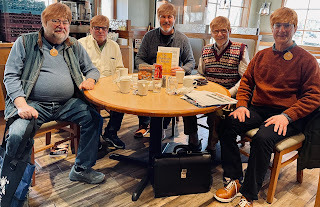 Five members of The Red-Headed League of Jersey meeting for breakfast in 2023. L-R: Bob Katz, Michael Bush, Jules Spada, Burt Wolder, BH.
Five members of The Red-Headed League of Jersey meeting for breakfast in 2023. L-R: Bob Katz, Michael Bush, Jules Spada, Burt Wolder, BH.Who is a specific Sherlockian that you think others would find interesting?
Honestly, I’ve ever met an uninteresting Sherlockian. We are an eclectic, fascinating group. I would refer everyone to read Linda and Terry Hunt’s, Aboriginals. It is my favorite Sherlockian book, packed with stories about captivating individuals.
What subset of Sherlockiana really interests you?
Two things. Chronology and BSI history. I know people like to deride chronology, but it has a long tradition, having come into the fore in earnest in 1932 following publication of H.W. Bell’s, Sherlock Holmes and Dr. Watson: The Chronology of Their Adventures and T.S. Blakeney’s, Sherlock Holmes: Fact or Fiction? Since then, many others have tried their hand at dating Watson’s stories, perhaps the most famous, or at least the most frequently quoted, is William S. Baring-Gould’s chronology. In 2021, Brad Keefauver founded the Sherlockian Chronologist Guild of which I am a member. Brad publishes a monthly newsletter, Timeline, packed with chronological goodness. I look forward to receiving it each month.
As far as BSI history is concerned, perhaps my UPS career had a Sherlockian impact after all. The company was founded in 1907 by one man, Jim Casey. Its founding and eventual worldwide growth always fascinated me. Fortunately there was plenty of material to read. I feel the same way about Christopher Morley, and how founded an organization like the BSI, and how it has grown and flourished.
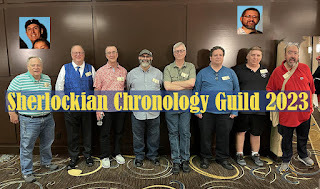
As the author of not one, but TWO chronology books, what keeps you coming back to that topic?
I hesitated writing about chronology for many years. It is a rabbit hole from which few have emerged. But, after I retired and had time on my hands, I decided to give it a try. To do things a little differently, I began with the Case-Book and worked my way backward through the Canon. After doing “The Retired Colourman” and “Shoscombe Old Place,” I thought to myself, “this isn’t so bad.” I kept going and going until I reached A Study in Scarlet. As with any other subset of Sherlockiana, there is always more to learn. That is especially true with chronology. I enjoy dating debates, even with myself, and remain flexible about changing dates when additional evidence is presented.
But your writing isn't just about chronology. You've written about dressing gowns, personality types, and D. Martin Dakin, among other topics. What is your process that takes you from idea sparking to publication?
I never really thought about the process. My ideas generally come two ways. First, after rereading a story for the umpteenth time, some question or inconsistency or historical reference will catch my attention. Then, I begin researching the topic and discover what others have said about the issue. I formulate a new hypothesis, and then determine if the existing data support or disprove the theory.
The other way an idea emerges is after reading the results of a (usually) psychological or sociological study, I think about how the findings might apply, or not apply, to one or more of the Holmes stories.
What book would you recommend to other Sherlockians?
There are several. In addition to the aforementioned Aboriginals, all of The Baker Street Irregulars Press Manuscript Series books are exceptional. And, as a fan of BSI history, I would be remiss if I did not highly recommend Jon L. Lellenberg’s series about the BSI, including, but not limited to, “Dear Starrett –“ / “Dear Briggs – “; Irregular Memories of the ‘Thirties; Irregular Records of the Early ‘Forties; Irregular Proceedings of the Mid ‘Forties; and Irregular Crises of the Late ‘Forties.
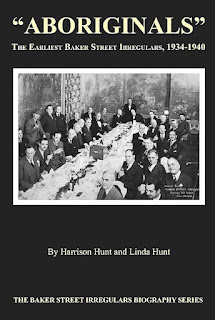
Where do you see Sherlockiana in 5 or 10 years from now?
Thriving. Worldwide, there are so many young, talented, passionate, and creative Sherlockians. I am one-hundred percent confident the hobby is in good hands and will only get better.
Healthy, local scion society activity is and will continue being the backbone of Sherlockiana. I foresee further growth in this area, both among the long-standing scions and newly created ones springing up.
I’m in the majority, among the 89% of Interesting Interviewees, who also believe the Sherlockiana future is bright!*
*See Rob Nunn, “Might I Ask You a Question or Two? A Snapshot of Sherlockiana as Seen Through Interviews with 100 Sherlockians,” The Sherlock Holmes Review: 2024 Sherlockian Annual. Indianapolis: Gasogene Books, 2025, pp. 68-75.
December 29, 2024
Interesting Interview: Kyndall Potts
Sometimes when I do these interviews, the interviewee won't send me as many pictures as I'd like to use so I have to add some that I find on Google. When you interview an artist though, that's not a problem. And boy, what an artist we have this week with Kyndall Potts! I'm just going to stop right now and recommend that everyone open up the link to www.kyndallpottsart.com to have open when this interview is over. You're going to want to spend some time clicking through there. Wow!
Kyndall is known for her vendor tables at Holmes, Doyle, and Friends and 221B Con. She is a member of The Agra Treasurers and The John H. Watson Society and active on social media. Sometimes my introductions for folks can list a million things that they are active in, but I think you'll see that Kyndall is a "simple and deep" kind of person. She doesn't spread herself too thin because once she is in to something she is IN to it. So, if you're not yet acquainted with this delightful and passionate Sherlockian, get ready to read about someone you're going to want to spend time with, Kyndall Potts!
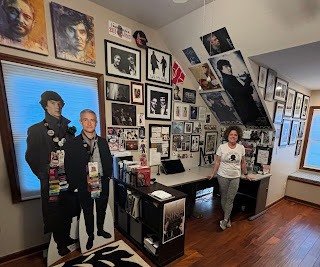
How do you define the word “Sherlockian”?
Rob, I believe you may have used the term “big tent Sherlockian” on the John H. Watson Society Zoom call recently, which definitely applies to me. There is a Sherlockian “spectrum,” and I think folks at all points along the spectrum are equally valid Sherlockians and contribute to the vibrancy of our community.
I do think that to be a Sherlockian, you must be more than a casual consumer of canon, pastiche, fanfiction, or film/TV variations of Holmes. There is something deeper that we Sherlockians share. It is something that reaches into our very souls. It drives us to “play the game,” to work Holmes into almost every conversation (even with complete strangers), to fill our homes with books, figurines, pipes, and stuffed dogs wearing deerstalkers, and, most importantly, to seek out others who understand and share our love for the great detective.
How did you become a Sherlockian?
I discovered Holmes only seven years ago at the age of fifty-three. I had always meant to read the canon but somehow never got around to it. I liked to listen to books on my long commute to work and was looking for the biggest bang for my buck in audiobooks. Sherlock Holmes: The Definitive Collection, narrated by Stephen Fry, fit the bill with almost seventy-three hours of content for only one Audible credit.
I was enjoying the stories and, partway through, remembered that a few years before, I had started watching that contemporary Sherlock Holmes series with the odd-looking but intriguing guy playing Holmes. It was, of course, BBC’s Sherlock. I started watching it again while still listening to the canon. In a bizarre coincidence, I listened to "The Final Problem" on my commute home (shocked and thinking Holmes was truly dead) only to watch "The Reichenbach Fall" episode of Sherlock that evening. I can pinpoint that day as the starting point of my Sherlockian journey. I was hooked.
I can’t overstate the impact of the sex appeal of Benedict Cumberbatch’s portrayal of Holmes. Yes, I’m that shallow. Without him, I would have enjoyed the canon but gone no further. Instead, I began searching social media for Sherlock and Benedict Cumberbatch fans.
And boy, did I find them.
Soon, I began reading and writing Sherlock fanfiction (I still do both). Then I began creating Sherlock fanart (I still do that, too). Next, I searched for Sherlockian groups in my area and found The Agra Treasurers in Dayton, Ohio (I am currently treasurer of that scion). I’ve been a panelist and/or art vendor at 221B Con each year since 2019, and this past January, I attended BSI weekend in New York for the first time.
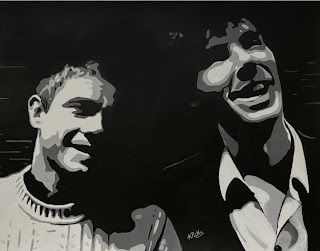
What is your profession, and does that affect how you enjoy being a Sherlockian?
I was a corporate tax accountant until I became a Sherlockian. In my pre-Sherlockian days, I only had room in my life for work and family. My discovery of Holmes quickly made me realize that something had to change. I was writing Sherlock fanfiction in my head in meetings or doodling Sherlock fanart on the back of tax court cases.
Clearly, I needed to rethink my priorities.
I wasn’t going to ditch my family, so work had to go. I left the corporate world in 2019 to write fanfiction and create art. I had started out doing only Sherlock fanart, but I quickly found I had a knack for painting and now have a (barely) profitable art business. You can see my art at www.kyndallpottsart.com
So, it wasn’t my profession that affected how I enjoyed being a Sherlockian. It was my being a Sherlockian that impacted my profession.
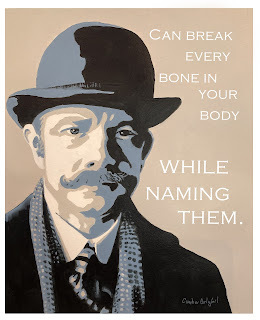
What is your favorite canonical story?
"The Red-Headed League." The case is so clever. No wonder it was Doyle’s second favorite.
Who is a specific Sherlockian that you think others would find interesting?
This is a hard one. You have already interviewed so many Sherlockians! I was lucky enough to have been a contributor to a book that was published this May, When the Rose Speaks its Name, an anthology of queer Sherlock Holmes fiction and poems. I think it would be interesting to interview one of the editors. You can find them (and info about the book) here: https://whentherosespeaks.com.
What subset of Sherlockiana really interests you?
It is perfectly reasonable to speculate that Holmes might have been gay, given his lack of interest in women. However, my particular interest is in the proposition that Holmes and Watson were more than just flat mates; they were soulmates.
Yes, I can see all of those eye rolls! “Oh, God. She’s one of those.”
We in the Johnlock camp believe it fiercely. Surely, given the times in which they lived, Watson could not publish the true details in his accounts. Or perhaps his literary agent advised against it. You might say we play our own “game within the game.” If you had told me ten years ago that I’d be devoted to a romance between Sherlock Holmes and John Watson, I wouldn’t have believed you. Yet here I am.
This weird little corner of Sherlockiana has given me so much. Here, I have met my dearest friends. It was my springboard into the more traditional areas of our universe. It inspired me to express my creative side, which had been dormant for so long. It makes me happy. It has changed my life.
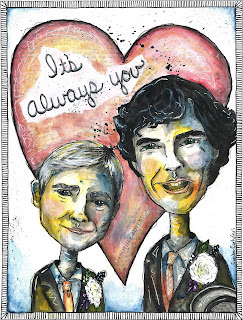
How long have you been creating Sherlockian art, and what inspiration has to hit for a new piece?
My first piece of Sherlockian art was done on notebook paper while at work, probably in early 2018. It was an illustration for a piece of Sherlock fanfiction by the woman who was destined to become my best friend and co-writer. She has it now.
I never know when inspiration will strike, but I cannot create art unless I’m inspired. This is why I don’t take commissions. I’ve got a Mycroft piece and a Jeremy Brett piece in my head that I will try to paint before 221B Con next year. I’m a very methodical artist, and I plan and think about a piece for weeks or months before I ever pick up my paintbrush, pastel, or digital pen.
I made an exception to my “no commissions” rule when Steve Mason approached me in New York this past January and asked me to contribute a piece of art to a special project he and Rusty Mason are undertaking for the 2025 BSI weekend. If you will be in New York, check it out at their vendor table.
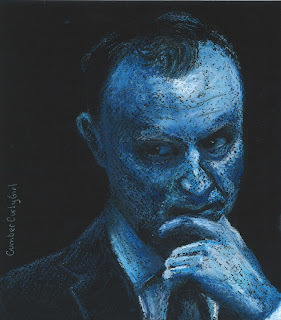
As someone who has been a member of The Agra Treasurers for some years, can you give us a peek behind the curtain into what goes into pulling off the Holmes, Doyle, and Friends conference each year?
The Agra Treasurers is a small scion. Our membership has hovered around twenty for the past several years, yet we put on a great conference! Dan Andriacco is the star of the show, putting together a consistently fabulous roster of speakers. My role is behind the scenes: booking the venue, sending e-mails, creating the registration forms, collecting the money, etc. I am the Mrs. Hudson to Dan’s Holmes.
Our biggest challenge is the lack of affordable venues in the Dayton area that have all the amenities we need and are convenient to the airport. We are busting out of our Friday night reception space but have found nothing larger.
If your readers haven’t been to Holmes, Doyle, & Friends, I encourage them to give it a try. The speakers and vendors are always great. A highlight for me is the karaoke on Friday night after the reception; it is so much fun!
The next one will be on March 22, 2025 (with a reception and karaoke the night before).
Info and registration materials can be found at our website www.agratreasurers.net.
What book would you recommend to other Sherlockians?
One book near and dear to my heart is Rare and Wonderfully Made by Kameo Llyn Douglas. It was published in 2022 by Improbable Press, a UK publisher of queer Sherlock Holmes fiction.
The book is a modern interpretation of Holmes and Watson. It is comprised of a series of vignettes covering the life of an autistic Sherlock Holmes from childhood to adulthood and focuses on his relationship with John Watson. Kameo has drawn from her experiences as the parent of an autistic son and as a special education teacher to paint an enlightening and heartwarming picture of Holmes and those who love him as they navigate the challenges of his unique nature. It is written entirely in the “221B” literary form. That is, every two hundred and twenty-first word begins with the letter “B.”
An interview with Kameo about this book appeared in the Autumn 2023 issue of Sherlock Holmes Magazine. Full disclosure: Kameo is my best friend and sometimes co-writer, and I created the cover illustration for the book.
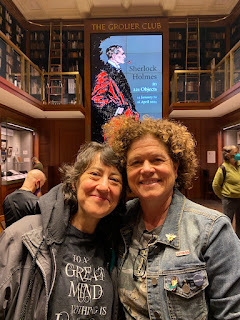
Where do you see Sherlockiana in 5 or 10 years from now?
I predict it will still be going strong. Of course, new blood will come and rile up the gatekeepers with some new interpretation, as Sherlock did. The Sherlock & Co. podcast (which is fantastic!) has drawn a new generation of potential Sherlockians, and I’m sure we’ll see many of those youngsters in our ranks down the line.
Some things will never change. We won’t stop revering Watson’s canon, and we won’t stop reciting "221B" or wearing our deerstalkers. But new traditions will be born, and new ideas and lore will be generated, adding to the richness of our Sherlockian culture and ensuring that it survives far into the future.
December 22, 2024
Interesting Interview: Matt Hall
Even though the term "nice Sherlockian" is the norm, I always feel it important to point out when the people I interview on here are nice folks, and man, does Matt Hall fit the bill! Anyone who's met him feels like they've reconnected with an old friend. Just sitting by him for a bit can elevate any Sherlockian gathering. (Yes, I'm speaking from experience here.)
Matt has been speaking on Sherlockian topics a lot lately, and whether it's in Minneapolis, Scintillation of Scions, Legion of Zoom, or any other place he pops up, you know you can count on an intelligent and charming presentation. And if you can't make to his appearances, there's always his great 221B Cooee blog to check out which conveys his great personality and depth of knowledge in each post. So let's get to meet our favorite Australian transplant a little better, shall we?
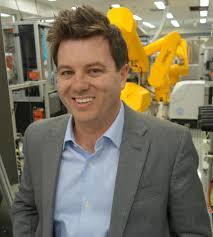
How do you define the word “Sherlockian”?
I think it's self-assigned. I have learnt that the Sherlockian world is a broad church, two Sherlockians can have completely different interests with little overlap. At the center of it all is Sherlock (or Doyle, or Watson, or Moriarty!). For example, I've learnt some people don't enjoy pastiches, others struggle to suspend belief and truly 'play the game', and others have zero interest in literary study. The one common element I've found in Sherlockians is friendship, whether it be at a scion meeting, via correspondence (including good old-fashioned mail), or over a drink or two.
At a wonderful Friday evening dinner at Dick Sveum's home. L-R: Max Magee, Glen Miranker, Peter Blau (the head of my local scion The Red Circle), the blog author, and Will Walsh.
How did you become a Sherlockian?
As a young boy growing up in Sydney I loved a book on my parents very small bookshelf, called 'Rivals of Sherlock Holmes'. I tried to read some (I was very young) and was confused because Sherlock never appeared! With a love of mystery stories generally, it was easy for Conan Doyle's work to stand out among the rest, and for me that's where it stayed - an absolute passion for Sherlock, regularly re-reading the Canon. What I did not know, was that other people who loved Sherlock were gathering, talking, published, and sharing the good word - I had no idea there was a Sherlockian world! Then, about eight years ago I wondered what order the stories were in, and Google led me to a podcast on Baring-Gould's chronology. Phrases like 'Baker Street Irregulars' quickly entered my ears, and I was opened up to a whole new world, reading journals and books.
It was a few years before I worked up the courage to join a Red Circle scion meeting, then COVID came. And that made it far easier - it was wonderful to join Zoom meetings and meet people, and then I took the plunge the first opportunity post-COVID and attended the BSI Empire conference in mid-2022. I knew nobody and wondered if I was going to sit lonely in the corner and embarrass myself. I walked in, and three wonderful people immediately introduced themselves to me and invited me to join them for dinner: Walt Colby, Jim Webb, and Tom Brydges. They tore down my nervousness instantly, and I've never looked back. I'll never forget it, and I hope to pay it forward in welcoming others.
Some of my first Sherlockian friends who took me under their wing and force-fed me 'Blue Carbuncle' cocktails at the Sherlock and Empire BSI Conference. This photo makes me happy. - L-R:Jayantika Ganguly, Tamar Zeffren, Maria Fleischhack, Phil Bergem, Karen Bergem.
What is your profession and does that affect how you enjoy being a Sherlockian?
I'm a scientist by training, working at the National Institutes of Health in Maryland. My training was in chemistry and pharmacology, and I now work in drug discovery for rare diseases. I've always loved science, and think that led me to have such strong affection for Sherlock - the chemist, the drug user, and the observer (compared to, say, Miss Marple). I do find myself reflecting on some of the scientific aspects of the Holmes story, and try to approach understanding the stories (or their real-world influence) through that lens. For example, a recent talk and article I wrote attempted to explain why phosphorus could have been used (relatively) safely, and the history of our understanding of phosphorus and its glow.
What is your favorite canonical story?
For me, it's 'The Hound of the Baskervilles'. Centered on a legend, perfectly written, plenty of attention for Watson, and lots of tension. That might be a cliched (common?) answer. Of the short stories, I dearly love the Six Napoleons. I have a feeling that is partly because of the wonderful Granada episode based on that story.
Who is a specific Sherlockian that you think others would find interesting?
It's such an incredible community. I'm going to say Mark Jones. His knowledge of the Doylean and Victorian literature world is amazing, he's just started as Editor of the Sherlock Holmes Journal of London, and his podcast is a joy (The Doings of Doyle). Recently, Mark published a book on the BBC TV series, Sir Arthur Conan Doyle. Mark is a wonderful example of someone who shares his knowledge with the community, and enriches it.
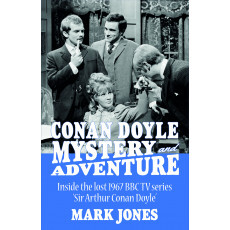
What subset of Sherlockiana really interests you?
I really lean into the literary study of the stories, and the real-world historical context for the stories. Nothing makes me happier than finding a small connection to Doyle in the real world. For example, I recently have a talk at the Sherlockian Saturdays at the Pratt (that you can watch on Youtube) about R T Norman. Who? Norman was the man who won the 1927 competition to guess Conan Doyle's twelve favorite Sherlock short stories. Norman was clearly a Sherlockian - yet nothing was known about him - and I had a lot of fun hunting him down, and shining a Sherlockian light on him.
Oh and books!
How does being a Sherlockian in America compare to being a Holmesian in Australia?
Well, that's difficult to answer, because I wasn't a Sherlockian/Holmesian in Australia - or I wasn't connected with the community. I wish I'd somehow discovered this community sooner. What I can say is that I am a member of the Sydney Passengers now, and join their meetings and try to contribute an article to each issue of the Passengers' Log. The focus of these articles is to provide a short biography on each person Doyle mentions in his memoirs of his Australian tour: Wanderings of a Spiritualist. It's a group worth joining - I once called the Sydney Passengers a 'scion' and received a note in typically independent Australian fashion that they weren't a scion, because they didn't need anyone's permission to exist!
What made you decide to start the 221B Cooee blog?
As a community, sharing and engaging with each other is so important. I recognized that publishing articles was an important way to support our society journals, but also found that I continually had small observations or findings I wanted to share. Publishing an article is lengthy process, and a lot of what I wanted to share wasn't important enough (or interesting enough!) to publish.
So I created 221bCooee.blogpost.com as a way to share posts and thoughts. I post on new books and journals; old newspaper articles I find ; my book collecting goals and progress (like my white whale goal of collecting all BSI publications) ; meetings and talks ; and miscellanea. I'm not sure that many people read it, but the pleasure for me is in putting the posts together.
Another pic I love of friends and community - walking around Stockholm with Mattias Bostrom was a lot of fun!
What book would you recommend to other Sherlockians?
I want to give a realistic answer. So many books are out of print - therefore rare and expensive. I do get a little down sometimes that so much wonderful Sherlockian writing is out of reach of those we want to read it - newcomers!
So I'll restrict my answer to something accessible, and this is going to be very left-field (to use the American).
Nothing has made me laugh harder that Vince Stadon's 'Hounded! My Lifelong Obsession with Sherlock Holmes and the Hound of the Baskervilles'.
Vince is based in the UK, and when the COVID pandemic arrived and he was well and truly locked down, he resolved to record his experience watching every adaptation of 'Hound of the Baskervilles'. The book is set against the backdrop of living during the pandemic, visiting the moors to experience the environment, and some hilarious self-deprecating moments (he steals a neighbors shoe for example to play out the scene in the book). I haven't read anything else quite like Stadon's book, and it's easy to find through Amazon, etc. If you like that book, you and I will get along!
Where do you see Sherlockiana in 5 or 10 years from now?
Bigger! Larger! More connected! I think there are so many new adaptations and productions of the stories - on stage, screen, and in print (including graphic novels) that there will continue to be a stream of new Sherlockians. How do we help them find our community? How do we ensure there are ways for everyone to get involved and meet them where they are irrespective of means - whether it's through zoom, at local meetings, or at conferences and weekend events. There are so many people out there (like I was) blissfully unaware of what they were missing out on - an enriching community of peers. I think over the next decade we'll find new ways to bring more people into our wonderful, irreverent, serious, literary world.
November 24, 2024
Interesting Interview: Jen Kneeland
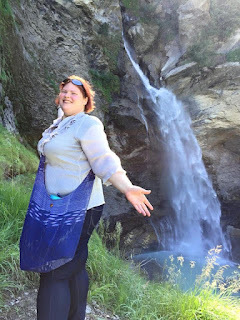
How do you define the word “Sherlockian”?
I tend to define “Sherlockians” as a self-selecting group. Anyone who is a fan of Sherlock Holmes has the potential to be a Sherlockian. To me, the main differences between a casual fan and a Sherlockian is people wanting to apply that label to themselves, and the drive for MORE. Whether that be more stories by way of pastiche/adaptations, more discussion around the stories, more time re-reading stories, or even just more community with other fans. A Sherlockian is a fan who seeks out something beyond just a single read of the original texts.
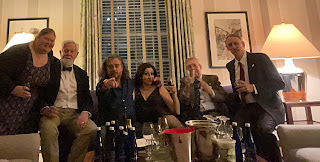
How did you become a Sherlockian?
I became a Sherlockian slowly. I’d read a few of the short stories ("The Red-Headed League" and "Adventure of the Speckled Band") in a middle school anthology and enjoyed them, but at the time it didn’t lead to my seeking more. In a way, technology led me back to Holmes—when I first got an e-reader and was looking at stories in the public domain to download, remembering the stories I had read years ago, The Adventures of Sherlock Holmes was one of the first books that I downloaded. It was still a fairly solitary pursuit for me for a few years, but as I met other fans I realized how much I had been wanting people to discuss the stories with and really dive deeper in. As more adaptations like BBC Sherlock and the RDJ movie came out I realized that I had developed quite strong feelings about what elements of each worked or didn’t work for me.
What is your profession and does that affect how you enjoy being a Sherlockian?
I’m now in my 20th year as an educator, and it absolutely affects my approach to being a Sherlockian. Sometimes it’s in somewhat silly ways—it’s not uncommon for me to use large chart paper when I’m doing a presentation or leading a discussion, and I’ve organized what I refer to as “field trips” to different exhibits or events. On a deeper level, I’m sure it’s a large part of my fascination with what led to the Sherlock Holmes that we all know. My work has mostly been with kindergarten through second grade students (and their teachers), but I’ve worked with students as young as three years old. As a literacy coach, a fair amount of my current work is focused around how people learn to read in the literal sense of decoding words and understanding meaning. But also the way the mind works and how we process and retain information. In some ways I do see Holmes as childlike in how he operates with the world—often driven by impulses, doing things for reasons that are clear to him (though not always others), and able to make connections that most of us don’t always pay attention to.
I guess this is a good example of how working in an elementary school influences how I engage as a Sherlockian. One of our other “field trip” Meetups was to the Whitney Museum. We had about a dozen people attend, so I sent them around in teams for an hour with a few cards each, then we gathered together and each team showed us the artwork they decided was a match for their cards.
What is your favorite canonical story?
While sometimes my favorite may vary, I am unashamed of how cliché of an answer a story that is always amongst my top 5 or so is—"A Scandal in Bohemia." While it was not the first short story that I read, I think it’s absolutely brilliant as a way to introduce Holmes to the world. He’s clearly so intelligent, but here he is out-smarted. While part of why I love it is indeed for Irene Adler, an even larger art is because of the dramatic tension that it creates. Most of the stories wouldn’t be as interesting if we didn’t have the idea in the back of our heads that this could be it—this might be the time that he really fails.
Who is a specific Sherlockian that you think others would find interesting?
There are pretty much no wrong answers here, but I’m going to say Jacquelynn Bost Morris. I first met her at one of the Scintillation of Scions events that she organized and have been lucky enough to get to know her better online. I am in awe of how kind and empathetic she is, as well as how ready she is to step in and help anyone feel welcome.
What subset of Sherlockiana really interests you?
I am utterly charmed by the quirky subsets that one might not think necessary, but that absolutely add to the feeling of connectedness. Queer Sherlockian groups are almost too obvious, since we of course bring our own identities to how we read the stories and characters. So it’s some of the smaller groups, where people have decided “You know what? Actually we need a group for Sherlockians who also_____” and just the ones I know of range from things like “love tea” and “smoke cigars” to “own tiaras” (or harpoons!) to “have dirty minds.”
What is 221B NYC and how does it differ from more traditional Sherlockian societies?
221B NYC is a group originally organized on Meetup.com that formed in 2015. While there are many wonderful scions and societies that meet in or near NYC there weren’t any that I was aware of that were very active with outings and tangential Sherlock Holmes experiences. We’ve done things like visited a corn maze, met to solve some of the “Hunt a Killer” mystery boxes, escape rooms, tea tastings, board game nights, scavenger hunts, trips to movies and plays, and museum visits. Once I realized how many people were becoming regulars with the group who hadn’t read any of the canon we started adding in more story discussions as well. There is something absolutely delightful about helping people discover the stories for the first time—it actually wasn’t uncommon for one or two people to come to our discussions who still hadn’t read the short story, or only read as much as they had had time for on the train ride there. It was so interesting to get such a fresh take on the stories or ask them what they thought might happen based on how far they had read and/or someone’s comment.
I also like the whimsical nature of some of the events that we’ve had. Sometimes members have said things like “I found the worst movie—we have to watch it!” Another activity that I particularly loved was the year that we met at a bar on May 4th and played with a giant Jenga set. I’d taped a cutout of Holmes and Moriarty to one of the blocks that we set up on top. After each turn moving a block there was a trivia question related to "The Final Problem." If the person answered correctly, it was just the one regular turn. An incorrect response meant needing to place two Jenga blocks in a turn, thus being more likely to make Holmes fall. Was it silly? Absolutely! But it was also a lot of fun!
Many of our original regular attendees are no longer in NYC—some had started to move pre-pandemic, but many others left after 2020. We haven’t been as active as we once were when it was common to have 2-3 events per month, but the group holds a special place in my heart and I’m always happy when we still have an event!
As a fan of the theater, you must have some strong opinions about adapting the Canon for the stage and screen. What are some standout performances to you?
A problem I have often found with Canon being adapted for stage is the question of who the intended audience is. Shows that are really focused on being accessible to people who haven’t read any of the stories often have to do too much world-building to effectively tell a story that is compelling to those of us already very familiar with Holmes. Sometimes the solution has been to engage in very silly story telling, which hasn’t always worked for me. Some ways that it has been more effective, in my opinion, include when it is blended with another element. A Sherlock Carol played at New World Stages for a couple of years, and wove together Holmes and Watson with characters from A Christmas Carol. It was a festive, seasonal delight.
This may seem counterintuitive but one of the best experiences I’ve ever had with Holmes on stage wasn’t actually a play. In 2015 Michael Chabon performed a dramatic reading of "The Final Problem" at Symphony Space. It was such a lovely way to really focus on the original text, but with the added experience of the audience reactions to hearing the story. (Additionally, I found it hilarious when he stayed late because his mother had sent him photos of some Holmes fanfiction she had found around her house that he’d written as a boy, and he wanted to read that aloud to us as well! It was a very memorable night!)
What book would you recommend to other Sherlockians?
I’d recommend A Study in Scarlet Women by Sherry Thomas. Particularly with a lot of modern adaptations it’s easy to forget just how much certain factors—like Holmes’ gender really played a huge role in how he was able to behave.
Where do you see Sherlockiana in 5 or 10 years from now?
I think we’re going to continue to see this interesting blend of the in-person events that are largely back as well as some of these wonderful online meetings that have helped connect worldwide Sherlockians. The work that has been done to start digitizing back catalogues of Sherlockian publications seems like a really promising way to ensure that the scholarship sticks around!
November 17, 2024
Interesting Interview: Stephen Chahn Lee
I first met Stephen Lee when he was handing out free books at the vendor's room during the Birthday Weekend. Who doesn't want to meet someone who is giving away free books? That book was Sherlock Holmes and the Silent Contest which I promptly dropped into my bag and moved around to other tables. But when I finally read this slim volume, Holy Cow! Stephen has done some amazing work to reconcile major issues in the Sherlockian Canon.
Soon after that, Stephen started popping up in all kinds of places: his Modern Detection substack, a Crew of the Barque Lone Star meeting, the Federal Bar Association, Harper's Magazine, and the 2024 class of the Baker Street Irregulars. So what's this guy got to say? Read along to find out!

How do you define the word “Sherlockian”?
To me, anyone who loves Sherlock Holmes stories and treats them as something worth analyzing is a Sherlockian. We don’t all read the stories the same way, but I think we all think that there’s something worth studying and discussing.
How did you become a Sherlockian?
I came to Sherlock Holmes later than many other Sherlockians. I did not read the stories as a child but read them all for the first time as an adult and while I was working as a federal prosecutor. When I read the stories, I saw things from the perspective of someone who had actually investigated real-life crimes, and I thought the stories were actually very good from that perspective. Sherlock Holmes is not a magician or a superhero, but someone who brings a lot of academic and practical experience to his craft, so much so that what he does seems magical or amazing to others.
Even so, I was not expecting to dig deep into Sherlock Holmes until I realized that Sir Arthur Conan Doyle never really told us in "The Final Problem" how Sherlock Holmes brought down Professor Moriarty. Holmes sees Watson for the first time in months and tells him that he has been investigating London’s criminal mastermind.
“If a detailed account of that silent contest could be written, it would take its place as the most brilliant bit of thrust-and-parry work in the history of detection,” Holmes says. “Never have I risen to such a height, and never have I been so hard pressed by an opponent.”
But Holmes and Watson never tell us what Holmes did. Instead, the rest of "The Final Problem" is a chase through Europe ending at the Reichenbach Falls.
I was disappointed in "The Final Problem," but then I read The Valley of Fear, which turned everything upside down. In that story, we learn that Holmes had been investigating Moriarty for many years and we learn some of the steps that Holmes has taken. But we also realize that some aspects of The Valley of Fear contradict "The Final Problem." Many Sherlockians had noticed this before, but I realized that some of my real-life experience investigating crimes could provide an explanation that fit within the canon. I ended up studying the entire canon in this light and then wrote up my monograph “Sherlock Holmes and the Silent Contest,” which I self-published and distributed at the BSI weekend in January 2022.
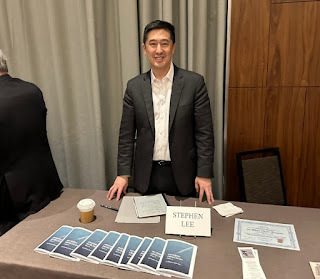
What is your profession and does that affect how you enjoy being a Sherlockian?
I was a federal prosecutor for 11 years and have been in private practice since 2019, and I focus on health care fraud cases. I started off my professional career as a newspaper reporter. All of this has given me a lot of experience conducting investigations, and I think that informs my love and appreciation for the Sherlock Holmes stories.
The stories hold up very well in terms of investigations and offer a lot of practical advice for people who do investigations. I love the line, “If you have all the details of a thousand [crimes] at your finger ends, it is odd if you can’t unravel the thousand and first.” This resonates with my experience investigating crimes. The first time I investigated a bank robbery or a health care fraud scheme, those cases seemed difficult. But as I did more of these cases, I knew what to look for and found things that others had missed.
What is your favorite canonical story?
I recommend "The Adventure of the Red-Headed League" because it’s such a great introduction to Sherlock Holmes and his world. The idea is clever, and the execution is fun.
In terms of the Silent Contest idea, I love A Study in Scarlet. I imagine what Watson and Holmes must have considered in deciding what should go into print. What secrets did they leave out, and what misdirection are they doing? One of the most famous parts of that story is when Watson reveals that his friend does not know whether the earth goes around the sun or vice versa. Everyone laughs at this, and Professor Moriarty would have laughed more than anyone else. But I think that Watson and Holmes actually had the last laugh, knowing that this seemingly extraneous bit would lull Moriarty into complacency.
Who is a specific Sherlockian that you think others would find interesting?
I’ve met a lot of amazing Sherlockians over the years, but I want to highlight Nicholas Meyer, whose Seven Per-cent Solution was a great attempt at reconciling the oddities of the Moriarty story. Nicholas and I came up with very different solutions, but I think that his work is a great supplement to the canon.
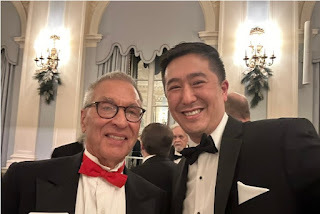
As someone who read the Canon for the first time in the past few years, how much had pop culture influenced what you did or did not expect from the stories?
I think my longtime love of comic books helped me view the canon with a fresh perspective. Readers of comic books are very used to stories that contradict each other and that effectively rewrite old stories (“retconning”), and Stan Lee of Marvel Comics offered “No-Prizes” to people who could explain away mistakes in the comics. All this probably helped make me very comfortable with seeing contradictions in the canon and then trying to come up with ways to reconcile them
What book would you recommend to other Sherlockians?
In terms of non-canonical fictional works, one of my favorites is Neil Gaiman’s A Study in Emerald, which brings Lovecraftian horror to Victorian London in a clever way. It’s better to read it not knowing much about the story, but it provides a great perspective on the canon.
For non-fiction, I highly recommend Daniel Kahneman’s Thinking, Fast and Slow. This book is a great resource for understanding how people actually think and the flaws in our reasoning. This is something that I think we all could better understand.
In terms of non-Sherlock mysteries, I highly recommend The Devotion of Suspect X by Keigo Higashino. This is not a whodunnit mystery, but a duel of wits and logic between two brilliant adversaries. It’s not quite Sherlock Holmes vs. Moriarty, but it’s close!
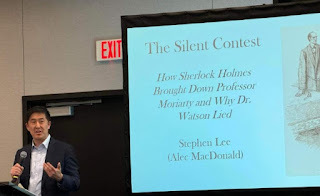
Where do you see Sherlockiana in 5 or 10 years from now?
I hope we get more fresh perspectives from people who love the stories but might not even know about the Sherlockian community. I actually sat on the Silent Contest for a few years after finishing my monograph because I was not sure what to do with it and did not know about scion societies at the time. I am sure there are more people out there whom we can reach and who would have a lot to give, and I hope to bring more people into our community.
October 20, 2024
Interesting Interview: JoAnn Alberstat
JoAnn Albertat is to Sherlockian editing what Aunt Bee was to The Andy Griffith Show: the quiet and steady presence that makes sure everything gets taken care of in the end. Along with her husband Mark, she has served as the co-editor of Canadian Holmes, the magazine of The Bootmakers of Toronto Sherlockian society, for many years. For as long as I've been a subscriber, the Alberstats have been at the helm and I love the familiar feel you can count on in every issue.
But JoAnn is more than just someone who is making sure other people's articles look good. She is out there putting forth her own research as well. JoAnn has presented at many Sherlockian gatherings, most recently at this year's Sherlock Holmes @ 50 conference in Minnesota. And don't be fooled by her calm demeanor. At this latest presentation, she took historical data, connected it to a Moriarty theory, and wrapped it all up with a song from South Park. There is a gifted intellect and a clever wit behind that friendly face. So let's get to know a hidden gem in the Sherlockian world with this week's Interesting Interview!
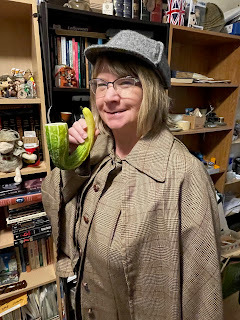
How do you define the word “Sherlockian”?
To me, a Sherlockian is captivated by Sherlock Holmes and his world in a way that makes them want to connect with others who have a similar passion. Then they can share and learn from each other – that’s the best part of being a Sherlockian.
How did you become a Sherlockian?
Growing up, I read parts of the Canon because my Dad had a Hanover edition on his bookshelf. I discovered the Halifax society, the Spence Munros, in the late 1980s when I came to Nova Scotia to attend university. I learned about the club from a fellow journalism student named Mark, whom your readers may know. I started attending the club’s meetings and social events and the rest is history.
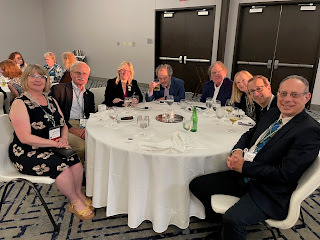
What is your profession and does that affect how you enjoy being a Sherlockian?
My background is journalism – I worked for 15 years as a reporter and editor at daily newspapers in Atlantic Canada. For the last several years, I’ve worked in public sector communications. In both fields, you need to be a strong writer, editor and researcher. It’s fun to also put those skills to good use with Canadian Holmes.
What is your favorite canonical story?
I would say “Hound” for its gothic atmosphere, strong sense of place and, of course, the Canadian connection. “Scandal in Bohemia” is also up there – it’s intriguing to see Holmes beaten at his own game and the origin of The Woman who became an archetype, although some Canadian Holmes contributors take a different view of the hype around Irene Adler.

Who is a specific Sherlockian that you think others would find interesting?
Edith Pounden of The Bimetallic Question in Montreal is fun to hang out with in person and online. She’s a founder of the Legion of Zoom, which helped connect me to the wider, global world of Holmes mania. Edith is also an organizer of the Montreal club’s monthly virtual meeting about Conan Doyle’s work beyond the Canon. This is a great way to explore more of ACD’s writing.
What subset of Sherlockiana really interests you?
The thing I most enjoy is the scholarship because it’s fun to fall down Sherlockian and Doylean rabbit holes. It’s also interesting that just when you think you’re finished with a particular topic, new information surfaces that can take you in a whole new direction. It happens every single time I take on a project and I know I’m not alone! For me, Conan Doyle’s spiritualist interest in wireless pioneer Guglielmo Marconi is a case in point. Stay tuned (pun intended!) for an updated version of the presentation coming virtually soon to The Crew of the Barque Lone Star.
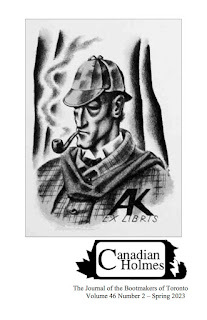
After all these years as co-editing Canadian Holmes with your husband, what are some highlights from that partnership?
The Winter 2022-23 issue comes to mind, as it was a tribute to Canadian Sherlockian Peter Calamai, BSI and MBt, a great friend and mentor. From the cover portrait by Toronto’s Peggy MacFarlane to the pastiche by “Horace Harker,” this volume was a labour of love for both Mark and me.
Whether you are connecting Professor Moriarty to Canada or connecting historical mysteries to Conan Doyle's writings, you have a penchant for bringing historical research to Sherlockiana. What is it about history that attracts you?
There’s so much social and technological change happening in Victorian times that’s reflected in the stories. Looking back today, there’s nostalgia about the era but there is also a downside of poverty, crime and discrimination. There’s no shortage of fodder to mine, including some with a Nova Scotia or Canadian connection.
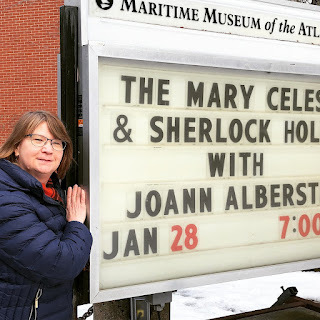
What book would you recommend to other Sherlockians?
The Case of the Murderous Doctor Cream, by Dean Jobb, delves into a real-life Victorian serial poisoner who operated on both sides of the Atlantic. The book also makes the connection to ACD’s work and Sherlock Holmes so Sherlockians would enjoy it. Dean is a former newspaper colleague of mine and columnist with Ellery Queen Mystery Magazine.
The Life of Crime, by Martin Edwards, is a recent study of the history of detective fiction that shows how Sherlock Holmes influenced the genre. It takes an international view of mystery writing and is a great reference for books and movies. At the same time, it’s enjoyable to read from cover to cover.
Where do you see Sherlockiana in 5 or 10 years from now?
I hope the hybrid model of connecting is here to stay as being online helps our world connect more often than we can in person. In my view, this model encourages more people of all ages and backgrounds to become involved. With another adaptation coming up in the CBS series on Watson, perhaps that will encourage more people to discover the stories and characters.
September 29, 2024
That One Michaelmas [HOUN]
Today is September 29, so Happy Michaelmas everyone! After today’s meeting, I’m looking forward to a goose dinner and cake for dessert. Of course, we will have to go vote for our local magistrate, and I guess all of the lawyers and judges will have to receive their annual blessings as well.
Wait, I seem to be getting nostalgic for days gone by. Instead I watched the last game of regular season baseball and there’s a family birthday party later today. What happened to the Feast of Saint Michael and All Angels and Michaelmas being the start of the judicial and academic years?
And what does September 29 have to do with Sherlock Holmes?
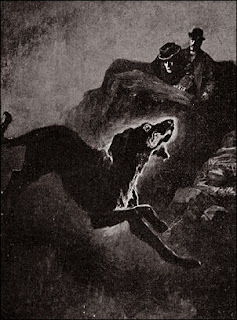
Duh, only Holmes’s most famous story, The Hound of the Baskervilles. You remember all of the great parts of that story:
“Mr. Holmes, they were the footprints of a gigantic hound!”
“The desolate, lifeless moor”
Selden, the Notting Hill murderer
Stapleton
…. And Michaelmas
Okay, some of you have blank looks on your faces. It all went down around the time of the Great Rebellion and the lord of Baskerville Manor, Sir Hugo, was known to all as a cruel, godless, and profane man. He was lusting after a yeoman’s daughter, but having enough sense she avoided him at all costs.
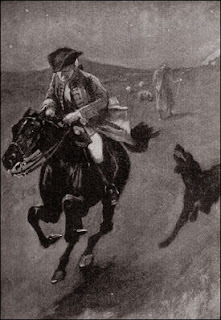
While her family was away one night, Hugo and his cronies kidnap this maiden from the family farm and bring her back to Baskerville Hall. The men lock her in a room and continue to drink and carouse downstairs while she escapes and runs across the moor. Baskerville finds her gone and sets out for her with his hounds.
The rest of the men join in the chase along with their pistols and booze. Empowered by the bravery that groups of drunken men seem to always have, they ride out after Hugo and eventually come across the hunting dogs, all whimpering and slinking away.
Past that, the kidnapped woman laid dead from exhaustion and fear and Hugo Baskerville’s body was also nearby. Plucking at the dead Baskerville’s throat was “a great, black beast, shaped like a hound, yet larger than any hound that ever mortal eye had rested upon.” As the beast’s blazing eyes turned toward the drunken mob, the party was definitely over.
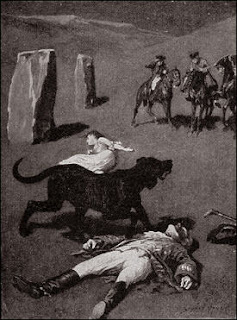
We get to hear how those guys were broken men for the rest of their days and about a family curse, but nobody ever mentions that Hugo Baskerville ruined Michaelmas. Like so many other drunken assholes throughout history, one guy ruins it for the rest of us. Yeah, his family was cursed by a dog, but I think the Baskerville curse is why we don’t get goose dinners, feasts with friends, or Michaelmas mattress sales today.
Instead of all of the possibilities that a modern Michaelmas could bring us, we are stuck with Halloween decorations for sale in September and unrelenting political ads that will continue for weeks and weeks.
Hugo Baskerville: ruiner of holidays.
September 22, 2024
Interesting Interview: Athelney Jones
Going through old issues of The Baker Street Journal will make you realize that Sherlockian fan art has been around for a long time. (The BSI even sold a book of one a few years back.) And when newer Sherlockians came to the hobby through the BBC's adaptation, we really saw an explosion of Sherlockian artists take to the internet. So this week's Interesting Interview subject, Athelney Jones, is following along in an age old tradition. As you'll see below, he's tackled adaptations from Ronald Howard to Sherlock & Co. In fact, his art got him hired on as Sherlock & Co.'s social media manager, so there's hope for those of who still want to get paid to be Sherlockians...
At 221B Con this year, I was immediately impressed with Jones's knowledge of the Canon and so, so many media adaptations and how well they adapted the original stories. While he showed off his scholarly side at every panel I saw him on, his dealer's table showed how much fun he had with the canonical characters. Whether it was the BBC Baker Street Boys meeting Sherlock & Co.'s Sherlock and John while Rosie plays with Archie, or his own spin on Paget illustrations, Jones has a flair for the Sherlockian world! (Of course his parents didn't actually name him after The Sign of Four character, that's just his online handle.) I've included as much of his art as I could in this post without turning it into a gallery exhibit, but if you like what you see below, I strongly recommend checking out more of his stuff on Instagram and Tumblr. I'll think you'll see below that if there are more people like Jones out there, the future of Sherlockiana is in good hands!

How do you define the word “Sherlockian”?
A Sherlockian is anyone who likes Holmes and Watson or the world within the stories, and has interest in exploring that through whatever medium they choose. If you want to be a Sherlockian, if you want to call yourself a Sherlockian, then I think you’re a Sherlockian. You actually wrote a great article about this last year that I really liked, and will point to here! Sherlockiana is an ever-evolving field and if we want to keep it alive we have to resist the urge to gatekeep.
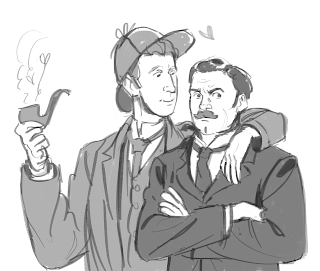
How did you become a Sherlockian?
BBC Sherlock fanfiction! BBC Sherlock was coming out when I was 14, at the time there were only 2 seasons. Obviously, I loved the show but what really kept me interested was the transformative work being created in online fandom. When the show lost its way, the fanart and fanfiction is what made me stick around.
I read the canon when I got into BBC Sherlock, and since then have tried to watch as many adaptations as I can. I love to see how each time period changes the way people interpret these characters and stories, AND how each adaptation responds to those that came before it.
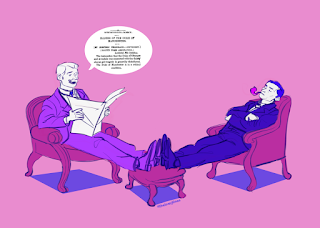
I’m an illustrator and graphic designer. Sherlock Holmes was kinda my muse growing up. I spent countless hours drawing him, and now that I’m older I’ve found a lot of work drawing him for other people. Also- I met Joel Emery through my fan art of Sherlock and Co. and now I work for the show! I got the job because I know most of the people in fandom, and always have my ear to the ground. So remember! Drawing gay fanart will get you places
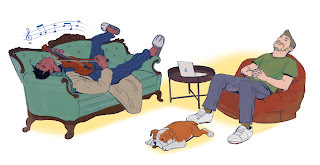
What is your favorite canonical story?
This is a hard question if I had to choose ONE probably "Illustrious Client." It’s got everything: the campy, evil, slightly-xenophobic, Austrian villain, Holmes getting beaten up and Watson going all mother hen on him, great illustrations, a Turkish bath scene, Kitty Winter, Shinwell Johnson, someone’s face getting dissolved by acid, Watson failing a pop quiz on Chinese pottery. It’s fantastic!
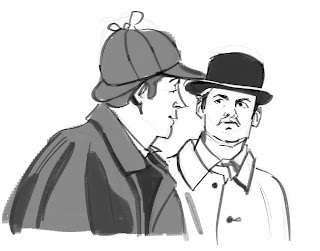
Who is a specific Sherlockian that you think others would find interesting?
There’s a lot going on in Sherlockiana right now, I can’t name just one person, buuuut:
Two big indie projects I’m watching are Beekeeper’s Picnic by Jabbage (who also runs Letters From Watson) and the zine project, Watson’s Sketchbook by Contact-Guy. Also a friend of mine, Inkonice recently contributed to the anthology project When the Rose Speaks its Name, which was the collaboration between a lot of artists and writers, so gotta shout that out too.
There’s lots of artists as well, but I’ll talk about that later.
Probably Sherlockian illustration! One of my favorite pages on the internet is the illustration page on the ACD wiki, I just wish it went further than 1937. I love to compare different artists' rendition of the stories and look at their different styles. Some favorites are Robert Fawcett, Raymond Leon Pallier, Leo O'Mealia, and of course Dorr Steele. I’m such a Steele supremacist, I love his work on the later stories. His work on Bruce Partington and Blanched Soldier is crazy! I really wish there was a collection of his Sherlockian works like there is with Paget. I don’t think there is one.. If there is let me know, I’d scoop it up in a heartbeat.
On a similar note, fan art! I try to keep on top of who’s making interesting work and get to know them. Always hope that they stick around, and delve a little deeper into the community.
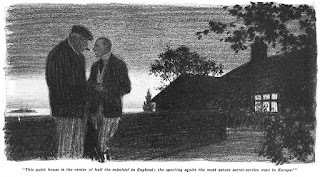
Who is an artist who has done Sherlockian work that you really enjoy?
Oh wow, so many. Contact-Guy for SURE! Their work on Watson’s Sketchbook is so inspiring, I highly recommend it. If you’ve somehow missed it.
Otherwise people doing canon-era work are: Nao (sunao555), Aydana (Aydana11918794), the incomparable Ghostbees, Gooolabatooo (gooolabatooo), and my buddys Eron (mustachecat212), Minh (haedraulics), and Chris (Theantichris, who made a fantastic 70’s AU of canon).
There’s a lot of Sherlock and Co. and BBC artists that I admire too, but if I went into that I’d be here all week. Lots of Chinese, Japanese, and Korean artists are into BBC Sherlock and they make some crazy impressive work, even now!
A lot of your fan art focuses on Sherlock & Co., yet it's an audio drama that has never shared images of the characters. How did you come up with your inspiration for Sherlock and John?
When I first listened to the podcast I had a really clear idea of what I wanted Sherlock to look like. There’s this illustration by thedrawingduke where Holmes and Watson are Dev Patel and Riz Ahmed. I saw that when I was young and it totally changed my brain chemistry. Since then, I’ve always really liked the idea of Holmes being Indian, so I decided to do that. Otherwise, I followed a canon-esque description: gaunt, tall, slender, bird-like, with the classic grey eyes and aquiline nose.
John was actually a little harder, I knew I wanted him to look like an Average Joe, but didn’t know anything more specific than that. I’m not gonna lie, I googled “average white guy,” and picked the first couple of soft-faced white guys I saw to guide my drawings. Joel described my John as a bimbo once and I think that’s a pretty funny way to summarize his whole vibe. I’m not a fan of the ‘stupid Watson’ trope, but he kinda does look like a bimbo, doesn’t he.
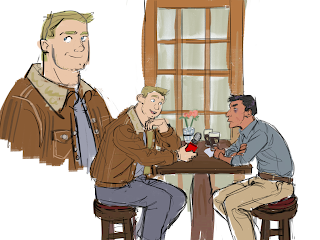 "This is the first drawing I did for Sherlock & Co., even though they don't really look like this anymore, this was the original 'soft-faced white guy' Watson"
"This is the first drawing I did for Sherlock & Co., even though they don't really look like this anymore, this was the original 'soft-faced white guy' Watson"What book would you recommend to other Sherlockians?
Lyndsay Faye, definitely. Her stuff is incredible. Her interpretation has so much heart, and they feel so grounded in the Victorian world. The amount of research she does is really clear and every story has a little something special that keeps you engaged. And of course, I love her characterization of the boys, they feel so much like real people.
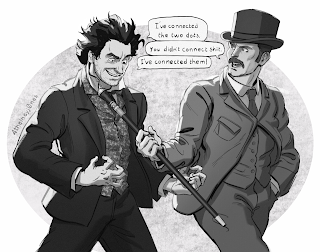
Where do you see Sherlockiana in 5 or 10 years from now?
Much the same, honestly? Interest in Sherlock Holmes is cyclical, it's not going anywhere, and I definitely see people my age and younger wanting to engage in it. The new wave doesn’t look much like the old wave, it’s the kind of people who’d be seen at 221bcon instead of a BSI dinner. They’re younger, gayer, more female and I think primarily interested in bringing a more diverse perspective to these stories.
I think BBC Sherlock acted as a kind of barker- bringing a lot of young people into the community. But ultimately the show didn’t share the same priorities as the fans, and a lot of people left feeling like there was untapped potential in these stories.
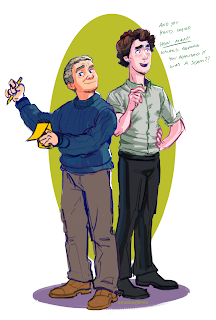 Ironically, I feel that shows main contribution to Sherlockiana is that it left people feeling like Holmes and Watson should be a couple, and I think whatever good mainstream adaptation manages to do that first will probably blow up and bring in a lot of new people. I definitely think it’ll happen in the next 5-10 years.
Ironically, I feel that shows main contribution to Sherlockiana is that it left people feeling like Holmes and Watson should be a couple, and I think whatever good mainstream adaptation manages to do that first will probably blow up and bring in a lot of new people. I definitely think it’ll happen in the next 5-10 years.
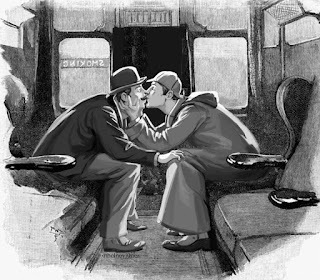 "This is the piece I made to celebrate Sherlock Holmes entering the public domain in January 2023"
"This is the piece I made to celebrate Sherlock Holmes entering the public domain in January 2023"
September 8, 2024
Interesting Interview: Edward Pettit
Just about a year ago, the Sherlockian world was buzzing with people talking about a new podcast, Sherlock Mondays, from The Rosenbach Museum and Library in Philadelphia. Manager of Public Programs, Ed Pettit was going to host a weekly discussion with a rotating cast of noted Sherlockians live each week on YouTube to discuss the stories we all love. I will admit that I only watched one, as YouTube isn't my preferred way to spend time. But when I discovered the episodes are also in an audio format, I downloaded a few to check them out. I fully admit that I am late to this party, but these discussions are SO GOOD!
And the biggest reason for this great show is Ed Pettit. I'm going to presume that most readers here have watched or listened to some episodes of Sherlock Mondays, so I'll be preaching to the choir here when I say that Ed is a charming and engaging host of this show. I got to meet Ed in person last January and can attest that his energy and interest in the Sherlockian world goes beyond those sessions. He's very active in the Philadelphia scion society, The Sons of the Copper Beeches, is a member of other groups, has consulted on a Sherlockian book, has given scores of Sherlockian presentations at The Rosenbach, and most interestingly hosted Sherlockian reading groups, game nights, and cocktail parties. As you'll see below, Ed Pettit is a guy you want to spend time with!
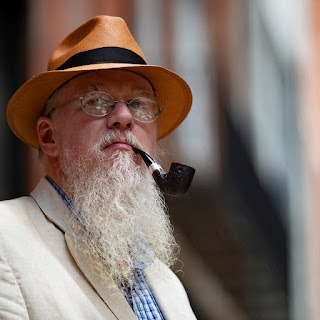
How do you define the word “Sherlockian”?
If you enjoy Sherlock Holmes and want to further explore theuniverses in which those stories occur, then you’re a Sherlockian. All gates and doors are open, just enter andengage. So you can be a Sherlockian whoprimarily engages in just movies or TV adaptations. But for me, all Sherlockians exist in twotypes: those who have read all of Doyle’s Sherlock Holmes adventures and thosewho have yet to read all of Doyle’s Sherlock. And as much as I love talking to Sherlockianswho have read everything (and then some), it’s actually those who are stillreading the stories for the first time whom I envy. That’s the Sherlockian Iwish I could always be.
How did you become a Sherlockian?
I think it was a gradual process. Sherlock Holmes stories inmovies and books were always there for me. Sherlock has a strong presence inpopular culture, so I think I always engaged in small ways with Sherlock.However, around the time when the Granada Holmes TV series with Jeremy Brettwas first airing in the U.S. (I was around 19 or 20), my Dad gave me a completeStrand edition with the Paget illustrations. My Dad wasn’t a Sherlockian,although he likely read some of the stories. I think he just found the book onthe discount table at a big bookstore and thought I would like it. And I read the stories and LOVED them,especially in their facsimile format. It was almost like encountering thestories like the first readers did. This was a world I wanted to be in. But what I can’t remember is if I startedreading the stories, then discovered Jeremy Brett, or if I saw some Brettepisodes and then started reading. The discovery of both is intertwined in mymemory.
My deeper involvement as a Sherlockian came when I became amember of the Philadelphia scion society, The Sons of the Copper Beechesseveral years ago. I am now a Master Copper-Beech-Smith and the Recorder ofPedigrees for the SoCB. For many years, Steve Rothman had suggested I join, butI always hesitated because the group was male-only in those days, and I didn’twant to belong to a gender-segregated organization. The first meeting Iattended was the first one that allowed women to participate and I have beenkeenly involved ever since.
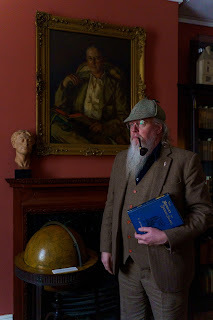
What is your profession and does that affect how you enjoy being a Sherlockian?
I create public programs for a rare book museum inPhiladelphia, The Rosenbach Museum & Library, with an astounding collectionof books and manuscripts. For the Rosenbach, I’ve hosted literary-themedcocktail parties, organized marathon readings of Moby-Dick and Dracula,set up reading courses for a many works of literature, interviewed authors, andon and on. But these days, I mostlycreate web-series called Biblioventures, featuring works from our collections.Over the past few years, I’ve hosted shows on Dracula, Frankenstein, JaneEyre, Pride and Prejudice, The Pickwick Papers, and Sherlock Holmes (As youcan see my interests lie in the 19th Century; I didn’t grow thisbeard for nothing), in which cohosts and I talk about books serially, over manyweeks, or months, in a kind of “conversational annotation.” Most of these showsalso feature cocktails, and I smoke my pipe throughout all of them (thebenefits of hosting them from my home office). Basically, my job is to drink,smoke, and talk about books.
Our founder, Dr. Rosenbach, also collected (and sold) ACD’sworks and we have Doyle’s manuscript of “The Adventure of the Empty House,” aswell as correspondence from Baker Street Irregular founders Christopher Morleyand Edgar Smith, and Vincent Starrett. So creating a Biblioventure series that highlighted this part of ourcollection was really exciting for me. Moreon Sherlock Mondays below. Butbasically, part of my job is getting to play in the Sherlock universe (and getpaid for it).
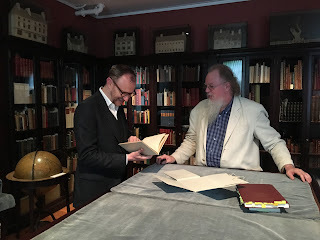
What is your favorite canonical story?
I think my favorite short story is still “The Man with theTwisted Lip,” but that may be because it was also my favorite Jeremy Brettepisode. I love what it says about identity and creativity. Neville St. Clairis a “legitimate” journalist who finds a way to make more money playing thebeggar Hugh Boone. I think there’s something going on there in Doyle’ssubconscious as a serious historical novelist who makes even more moneycreating his Sherlock Holmes adventures. I don’t think Doyle was ashamed of his Sherlockian output, but he wascertainly bemused and sometimes annoyed that his most successful work was notliterarily important. Also, whenever I need to use a pseudonym, I use HughBoone. One time I submitted poetry to a magazine (whose main editor I knew) asHugh Boone, so he would give me honest feedback. “Blue Carbuncle” and “Scandalin Bohemia” also rank very high because they are perfectly constructednarratives.
My favorite novel is probably still The Sign of the Four.I think Hound is likely a better novel as a work of fiction, but theworld Doyle evokes in Sign, the characters, the backstory about thestolen treasure, the chase at the end, are still very thrilling. It’s theadventure I want to go on with Sherlock and Watson. And I would definitelysmoke the hookah with Thaddeus Sholto.
Who is a specific Sherlockian that you think others wouldfind interesting?
I’ve met so many over the years and pound-for-poundSherlockians might be the most interesting people of all the many literary fangroups I’ve been part of. Such a richdiversity of minds. Attending scion meetings, or the BSI weekend, I am alwaysexcited to just listen to everyone tell their stories. The Sherlockian whom Iam getting to know right now is Olivia Rutigliano, BSI and editor at LitHub andCrimeReads. She’s cohosted a couple of special Sherlock Mondays episodes ondetective stories that were published when Doyle stopped writing Sherlockstories after “The Final Problem.” Olivia is so brilliant and knows so muchabout 19th Century literature (she’s going to be cohost on my nextBiblioventures series called Monsters and Ghosts, featuring Strange Case ofDr. Jekyll and Mr. Hyde and A Christmas Carol). Ask her about ladydetective stories. You won’t be sorry. With that said, I’d also have to say themost interesting Sherlockian to me will be the next one I meet.
What subset of Sherlockiana really interests you?
I’m a literary historian, so I’m always interested in thepublication and reception of Doyle’s works and how their literary reputationhas developed over time. Because of this, I rarely play The Game. I enjoyreading what others write in Game-mode, but I’m too invested in Doyle as anauthor to do this myself. I’m also a big fan of genre crossover adaptations,especially with monsters or science fiction (Monstrum Opus of SherlockHolmes, Campbell and Prepolec’s anthologies like Gaslight Grimoireand Gaslight Grotesque).
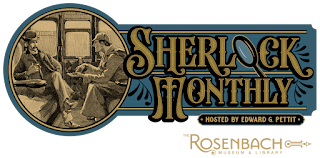
How did Sherlock Mondays come about?
During the Covid pandemic, I had to work at home and figureout ways to continue public programs for the Rosenbach. Thus, Sundays withDracula was born. We have a substantial Bram Stoker collection at theRosenbach, including Stoker’s research notes for Dracula. So I hosted a weekly show with rotatingcohosts, talking about one chapter per week of the novel. I also brought inspecial guests (Leslie Klinger, Kim Newman, David Skal, Sir ChristopherFraying, and Mark Gatiss) for some of the episodes and created a signaturecocktail for every show. This show wassuch a success that we continued with other novels from our collections.Because I have to invest so much of myself into these shows (they are verypersonality driven), I need to choose books I can live with and be interestedin talking about for months on end. So, all of the books so far have also beenpersonal favorites of mine.
Sherlock Holmes stories were a perfect fit for the showbecause of both our collection and my own interests. Sherlock Mondays began inSeptember 2023 and streamed live for 40 episodes, all free to watch on theRosenbach’s YouTube channel (except for eight eps on The Hound of theBaskervilles, which were subscription only). We had great BSI membercohosts and special guests, who I think all may have been interviewed here onthis blog over the years (Anastasia Klimchynskaya, Mary Alcaro, Monica Schmidt,Curtis Armstrong, Scott Monty, Burt Wolder, Leslie Klinger, Mark Jones, PaulChapman, Steve Doyle, Max Magee). And Mary Alcaro, a great mixologist, createdall the Sher-locktails for the program. I also smoked a different pipe forevery episode. In effect, I got paid to talk about Sherlock Holmes for 40 weeksthis year (and drank my way through it all!). We covered everything from AStudy in Scarlet through the “Empty House,” in published order, and now theshow will become Sherlock Monthly, starting in November 2024. We’ll pickup with “The Norwood Builder,” and every month I’ll have a different cohost totalk about a story with me. To finishthe Canon, this will probably take about three years. Yes, I realize how luckyI am.
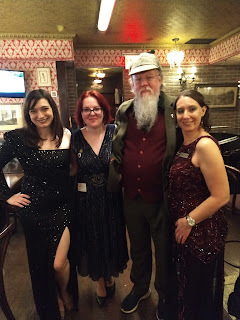
What are some of your favorite moments from SherlockMondays so far?
I love it best when the cohosts and I go down rabbit-holesabout details and that happened on almost every episode. But honestly, becauseI do the show live for over 30 weeks in a row, they kind of blend together inmy head. There’s no post production and just as one ends, I am working on thenext one, so I get no time to reflect on what we’ve done. It’s always aboutwhat’s next (and for me that will be Jekyll and Hyde which begins onSeptember 23, 2024).
What book would you recommend to other Sherlockians?
Even though Les Klinger’s New Annotated Sherlock isthe gold standard for Sherlockian books, I still get a visceral pleasurerereading William Baring-Gould’s Annotated Sherlock. I can only imaginewhat it was like for its first readers. Nothing like this had ever been writtenfor a fictional universe. If you are a new Sherlockian, I think this is the onebook to get.
And if you are an already deeply committed Sherlockian andyou haven’t read Doyle’s other works yet, I would recommend, hisgothic/supernatural stories. You can find lots of different editions of these.My favorite is probably Gothic Tales edited by Darryl Jones for Oxford UniversityPress, but there’s also the excellent Tales of Unease collection, editedby David Stuart Davies for Wordsworth. Doyle was a brilliant writer of scarystories.
Where do you see Sherlockiana in 5 or 10 years from now?
I think it will continue as it has been, becoming more andmore open to all kinds of different people with different tastes and viewpoints.Sherlockiana used to be a white male world adept at gatekeeping. And that’s notunique to Sherlock. This has been the case for most reading communities fromShakespeare to Austen to Dickens to Doyle. Their devoted readers wanted to keeptheir authors to themselves and frowned upon interlopers. I see that kind ofgatekeeping disappearing rapidly over the years, especially as works that wereformerly considered “popular culture” have completely crashed into the world ofcanonical literature. The result is a far richer place where we have theopportunity to experience new and exciting viewpoints that come from readers,not just trained specialists.
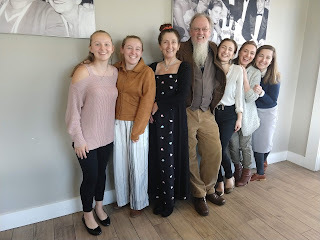 Ed with his wife and five daughters
Ed with his wife and five daughtersAugust 25, 2024
Interesting Interview: Sandra Little
One of the best things about doing Interesting Interview blog posts is getting to know someone better than I did before. This week's interview with Sandra Little is a great example. I've known them as a member of the John H. Watson Society and editor of their journal, The Watsonian (one of the best Sherlockian journals out there, in my opinion). Because The Watsonian is such an inclusive publication, I figured they had always been the personification of open-mindedness in Sherlockiana, so I was surprised to find out that they started out as a strict traditionalist!
Sandra is a recipient of a Jan Stauber grant from The Beacon Society, has been a steady presence and presenter at 221B Con, given a talk at The Women of Sherlock Holmes conference in Dallas, been part of anthologies from Belanger Books and Doyle's Rotary Coffin as well as the new Sherlockian collection, , and is a coordinator of Holmestice, a twice a year digital gift exchange between Sherlockians. If all of that weren't enough, Sandra is a fellow educator, and during the busyness of the first weeks of school, took time out to share their views on Sherlockiana with us. That's dedication to Sherlockiana!
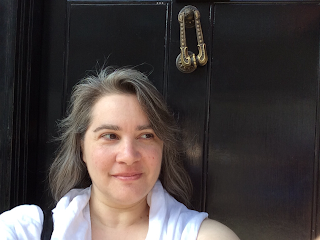
How do you define the word “Sherlockian”?
I think everyone defines this differently. For me, it’s when you pass the point of no return. It is just too much of a part of your psyche, thoughts, social life…your soul…to just move on to something else. As specific terminology, I think people generally identify it with the Canon, but for me it is a level of fascination with any subset of Sherlock Holmes. (Even if you shift between variations, it all comes back to ACD.)
How did you become a Sherlockian?
I started the journey when I was 10 years old and found my grandfather’s copy of “A Treasury of Sherlock Holmes” (Hanover House, with an intro by Adrian Conan Doyle, compiled sometime in the mid 50s—for all you book nerds). It is now in sad, sorry shape and my ex almost threw it out twice. But I read that, and I was hooked. I not only read it over and over (I thought the stories it contained were the only ones that existed), but I wanted to transform them into plays and perform them.
When I found out about societies, I immediately wanted to join—but I was 10 and stuck on Long Island and The City was a world a way and they kidnapped people there and injected them with heroin. As obsessed as I was (and I really was), I still wasn’t a true Sherlockian. Not yet. Though the seed had been planted. I know this because I eventually forgot about it for a while.
But it all came back to me with the first RDJ movie, and by the time BBC Sherlock rolled around and I finally decided I wasn’t too much of a purist to try it out—which is kind of hilarious, that I was once a gatekeeper who thought “The 7 Percent Solution” was sacrilege— it hit me all at once. Now the 10-year-old me inside my head was gleefully yelling, “I knew it! I knew Rache was really Rachel!”, I was joining scions and I was creating my own content. It was a sort of homecoming. It was where I belonged.
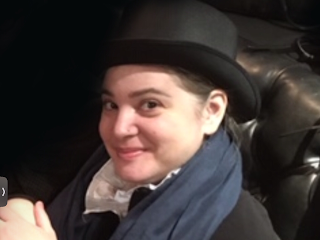
What is your profession and does that affect how you enjoy being a Sherlockian?
I have had a lot of jobs before I settled back into my original field of education. I think it really does affect my areas of focus. Because I taught history, I cherish not only the preservation of the stories but also love to examine how our collective interpretation changes over time. I’ve also taught parts of the canon to adults working on their GED and rebuilding their lives, and they have shown me things I wouldn’t have given nearly enough thought to otherwise— like when an ex-con student pointed out how Holmes actually believed Horner was innocent, and how much that meant to her. It makes me want to share what I see as the real Holmes with other people. And I am sure that that is the teacher in me.
What is your favorite canonical story?
It depends on my mood. I can absolutely say I prefer the short stories over the novels. Blue Carbuncle? Red-Headed League? Devil’s Foot? Dying Detective? I find myself drawn to stories that address key moments in the Holmes and Watson relationship more so than the quality of the mystery itself. (OK, points for SIGN, even if it is a novel, for having what I consider one of the saddest endings in all of literature.)
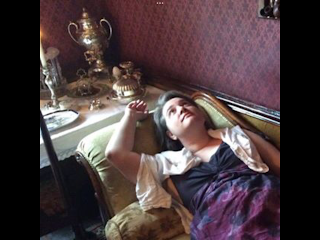
Who is a specific Sherlockian that you think others would find interesting?
So many people! So many are well-known in certain circles, but not throughout fandom, and who I feel don’t get the attention they deserve. Milquetoast (the future of Sherlockian scholarship), Vulgarweed (my co-mod for the Holmestice project and a fearless and incredibly well-read fic writer), Jones (a fantastic artist and now a vital member of the Sherlock & Co team), all the staff who keep 221B Con (which may be nearing its final year) afloat… soooo many people who you might not see at your regular scion meetings, but who would amaze you with their contributions.
What subset of Sherlockiana really interests you?
What I find myself drawn to are the countless adaptations of the original work and how one can get to who Sherlock Holmes and John Watson are at their very core. How far can we journey from the original premise and still see Holmes there? Can we change time periods, gender, race, profession…and still keep his Holmesness? I think so, and the process fascinates me. I also love collecting things from Victorian and Edwardian times, like books, coins, postcards, medicines, and pocket-watches.
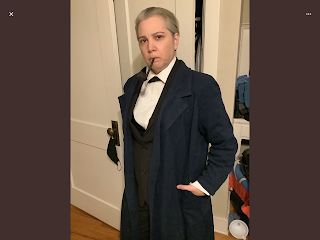
How has being editor of The Watsonian affected how you enjoy this hobby?
Working on The Watsonian serves as a constant reminder of how broad this fandom is, and I always do my best to represent people from all corners of it. I see how it is evolving and evergreen. And I see how much it means to all sorts of people. I feel an obligation to make sure everyone has a voice and the torch gets passed on. So, it has made me a much more involved contributor to the immortality of Holmes and Watson, and I’m very proud of that.
Whether it is your involvement on the Sherlock & Co discord or your role as an Archive of Our Own author, you are on the cutting edge of "new" when it comes to Sherlockiana. What argument would you make to a more traditional Sherlockian to check out interpretations of the Canon that might stray from what they are used to?
Well, I thank you for that positive assessment, but the true cutting edge folks are the ones out there right now creating their own webcomics, and I haven’t even begun to scratch the surface of that content!
First, I’d probably say to read what you enjoy reading. Not everyone wants to play in the Holmes Adaptation Sandbox, and that's fine. They can go have fun on the slide. But…if they should become curious about what’s on offer lately, I’d remind them that trying something new in no way detracts from their old favourites. They’ll always be there waiting any time someone wants them.
I’ll just circle back to what I mentioned earlier: I was a hardcore traditionalist when I first encountered the Canon. I didn’t like anyone messing with it. Then, I eventually realised just how often people didn’t use canonical Holmes as their starting point when flinging mud at new adaptations. They’d watch RDJ and say things like, “My Holmes is no action hero!” Holmes: who lost his left canine at Charring Cross, sent Woodley home in a cart in a “delicious” bar brawl, and, according to McMurdo, wasted his true gifts as a boxer. They were using their own uniquely-cultivated perception of Holmes. People shouldn’t fault anyone who does this; we all do it. Holmes is ridiculously projectable.
You also can’t go around saying, “I hate a modern Holmes,” but love Rathbone. Holmes was always cutting edge, of his time or ahead of it, with his fingerprints and his uncontaminated crime scenes and monographs on the behaviour of pets. And he was a contemporary figure without a trace of wistful nostalgia. So, to do modern updates actually makes sense. Different generations want different things out of the guy, and the miracle is… he always delivers. We have needed a wartime hero, a cynical challenger of the status quo, a neurodivergent champion, and Holmes took it all on with ease because, in Canon, all these things are already there. If that theoretical Sherlockian talked to enough people who enjoy that new something, they would find that a surprising number (to that Sherlockian, at least) are Canon-literate and can point out precisely where any idea came from, using Doyle’s written words.
And that…is fun.
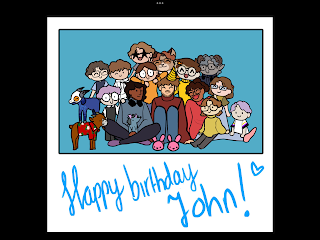 Artwork by tsukihasnolife
Artwork by tsukihasnolifeWhat book would you recommend to other Sherlockians?
“A Study in Brimstone” by G S Denning. It manages to be so canon and so not canon at the same time. Yes, it is bonkers, but in a way that truly meshes with the original and shows a great deal of scholarship and attention to detail. And it’s really funny. (And also my book, “Astrakhan, I Perceive”— once I finish it up and get me a publisher…)
Where do you see Sherlockiana in 5 or 10 years from now?
Every time a new form of Sherlock Holmes comes to the fore, a new group of fans discover the canon. Perhaps ten years is a little too soon for a new version to grab hold of the collective consciousness, as it is something of a generational pattern? In five years, we will likely still have Sherlock & Co doing their thing and hopefully going strong; we will probably have a nice and profitable Cumberbatch/Freeman Reunion Christmas Special within ten; and someone better give the rapidly expanding queer wing of the fandom a mainstream Johnlock ASAP.



